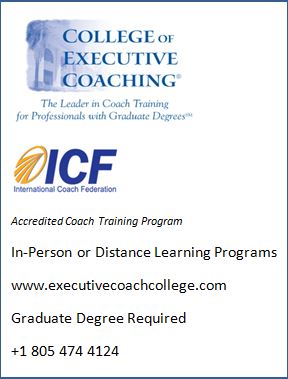Executive Coaching is the practice of supporting an individual, referred to as a coachee or client, through the process of achieving a specific personal or professional result. Dr. Jeffrey Auerbach, founder of the College of Executive Coaching, says that the methodologies of coaching are numerous but are predominantly facilitative in style; the coach primarily asks questions and engages in a dialogue driven by the coachee's goals. Coaching is differentiated from mangagement consulting and counseling disciplines.
There are a variety of approaches within the coaching methodology. Coaching is performed with individuals and groups, in person, over the phone and online.
The facilitative approach to coaching in sport was pioneered by Timothy Gallwey before this sports coaching was (and often remains) solely a skills-based learning experience from a master in the sport. Other contexts for coaching include team coaching, life-coaching, career coaching, and wellness coaching.
Today, coaching is widespread. For example, the College of Executive Coaching's 2005 State of the Coaching Industry report described it as a $1 billion industry and in 2011 it has been reported to be a $1.5 billion dollar growth industry. The UK's Chartered Institute of Personnel Management reports that 51% of companies "consider coaching as a key part of learning development" and "crucial to their strategy", with 90% reporting that they "utilize coaching". The basic skills of coaching are often taught to managers within organizations specifically to improve their managing and leadership abilities, rather than to apply in formal one-to-one coaching sessions. Executive coaching skills are also applied within team meetings to improve business and organizational performance.
Executive Coaching Information
Menu
HomeExecutive Coaching Defined
International Coach Federation Accreditation
Credentialing of Executive Coaches
Executive Coaching Information
Accredited Executive Coach Training

